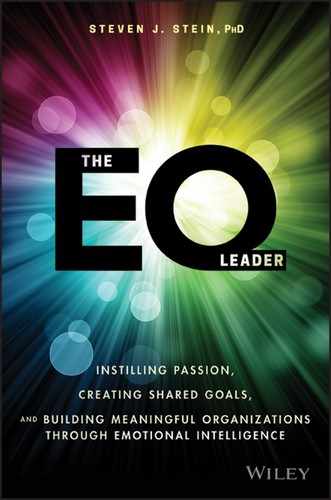16
Entrepreneurial Leadership and EQ
Before you are a leader, success is all about growing yourself. When you become a leader, success is all about growing others.
—JACK WELCH
The EQ Leader: Entrepreneurial CEOs
What do we know about entrepreneurial leaders and their emotional intelligence? There have been relatively few studies that have looked at this aspect of leadership, especially in relation to performance. How do we gauge performance of entrepreneurs? Well in this case, one of the measures that matters is profitability. After all, if a company isn't profitable it's not likely to exist for long.
In a study we published in The Leadership and Organization Development Journal, we assessed the emotional intelligence of entrepreneurial CEOs. We were interested in a number of questions that related to leadership, emotional intelligence, and business success.
We recruited a sample of 186 executives (159 males and 27 females) belonging to one of two executive mentoring associations, the Young Presidents' Organization (YPO) and the Innovators' Alliance (IA), who voluntarily participated in our study. Participants ranged in age from 27 to 59 years, with an average age of 41.37. To gain membership into these associations (at the time of the study), an individual must hold the title of CEO, Owner, President, or Managing Director of his or her company, and that organization must generate a minimum of $2 million annually. The minimum number of full-time employees in these organizations was 10; however, many of those included in the sample had 50 or more employees. The type of industry in which each firm operated varied substantially, ranging from information technology to professional services to manufacturing.
Members of the two leadership organizations were enlisted to complete the EQ-i as part of a series of emotional intelligence presentations that I gave to CEOs. Participants were also asked to respond to a questionnaire examining their perceptions of common business challenges they were experiencing. The same group was also evaluated on organizational performance, which was measured by an organization's profitability. All participants were aware that their results would be analyzed at the group level for research and teaching purposes.
How does the emotional intelligence of business leaders compare to the general population? There has actually been some speculation that business CEOs have lower emotional intelligence than the average person. Some “experts” in emotional intelligence have claimed that as someone rises up the corporate ladder, their emotional intelligence decreases.
Well, our evidence-based research on CEOs paints a somewhat different picture. The CEOs in our study scored significantly higher in 8 of 15 EQ-i scales than the general public as shown in Figure 16.1. The average person (based on the scores of thousands of people in our standardization sample, which was stratified based on North American census data) scores 100 on our scale (standard deviation of 15). The CEOs scored significantly higher in Self-Regard, Self-Actualization, Assertiveness, and Independence. These subscales reflect skills that facilitate self-awareness and self-expression effectiveness. The ability to put together assumptions, theories, and beliefs with confidence, as well as remaining self-directed, likely enhances the level of influence for those holding leadership positions.
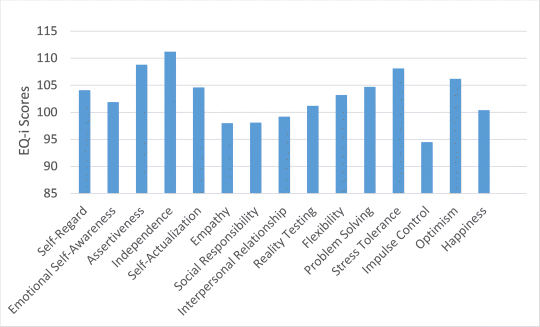
Figure 16.1 EQ-i Scores of CEOs
Source: © 2016 Multi-Health Systems Inc. Toronto, Canada, www.mhs.com. All rights reserved. Reproduced with permission.
In addition, CEOs scored higher in Problem Solving, Flexibility, Optimism, and Stress Tolerance. These subscales constitute the Decision Making and Stress Management composites, suggesting that executives can succeed leading their companies through the continual adjustment of emotions and thoughts, and the ability to assess problems and offer solutions. These findings support Shaul Fox and Yair Amichai-Hamburger,1 who found that to empower an organization, a leader must maintain a positive and calm attitude when facing adversity, as well as when setting a corporate vision.
We might have expected that these leaders score higher than the general public on all the emotional intelligence scales. However, this was not the case. There were some scales where this group scored lower than the average. These CEOs scored significantly lower than the general population on the subscales of Social Responsibility and Impulse Control. A lower than average score from the executive sample on the Social Responsibility scale may not be that surprising when considering all of the different responsibilities that an executive performs. A leader often faces difficult decisions (e.g., layoffs, restructuring, mergers) that are relevant for the organization's continued prosperity; however, the same decision may be detrimental to smaller groups or individuals. In order to make these tough decisions, an executive may at times have to lower his or her social consciousness. However, leaders who score higher in social responsibility may stand out from the crowd.
In addition, these leaders scored lower than the average person in impulse control. This score taps into the construct of impatience, as well as impulsivity. The constantly changing demands of the marketplace coupled with executives' desire for organizational success may impact the leaders' level of patience. Entrepreneurs tend to have lower impulse control as they get bored with routine tasks or jobs.
Another area we examined was the relationship between various business challenges and emotional intelligence. The challenges we thought most relevant to CEOs of growing organizations were: hiring employees, managing others, retaining employees, training employees, raising capital, managing growth, marketing, innovation, and coping with technological change. All of these challenges were identified as requiring effort and focus for this group.
To what degree does emotional intelligence play a role in managing these business challenges? Our first finding here was that the CEO overall emotional intelligence score was positively related to the degree to which a challenge was perceived as easy with respect to managing growth, managing others, training employees, and retaining employees. Not surprisingly, emotional intelligence showed significant relationships with those challenges that center on interpersonal activities as opposed to more task-oriented challenges such as raising capital and coping with technological change. In other words, those with higher emotional intelligence scores perceive these interpersonal activities as less challenging.
The results support the theoretical and empirical components of the Interpersonal Relationship composite scale. Given that the relationship between the emotional and social perceptions of business challenges is derived from social interactions, it is only natural that the strongest and most significant relationships exist between this global construct of emotional intelligence and social challenges. That is, leaders with enhanced interpersonal skills better manage those aspects of the business that involve dealing with people.
An interesting pattern of correlations was found between the composite scales of Self-Perception and Stress Management and the business challenges of: managing others, training employees, and retaining employees. These findings suggest that top executives are aware of key emotional information (their own and the people they lead) and use this information in their interactions with others, as well as when delivering their message to the organization. By doing so, executives are better able to increase staff motivation and dedication. Decision making was also positively related to managing growth, coping with technological change, managing people, and training employees. How leaders manage change, consequently, may have to do with their capacity to use emotions when making decisions as opposed to simply relying on analytic frameworks.
At the subscale level, we found that Flexibility had the highest positive association with perceived business challenges, thereby underscoring the role that emotional change can have when coping with organizational change. In other words, individuals with greater flexibility were more likely to perceive ease in dealing with business challenges.
Optimism, the capability to maintain a positive attitude even under trying conditions, was positively related with perceived ease of managing growth, managing others, and training employees. These leaders benefit from viewing their subordinates in a more encouraging way in order to tap into any unrealized skill sets. Lastly, both Self-Regard and Self-Actualization, which comprise the Self-Perception composite scale, were positively related to managing others, training employees, and retaining employees, thereby indicating that intrinsic motivation and self-assuredness can likely moderate interpersonal challenges that arise within the workplace.
Another analysis we did with this group was quite unique. We separated the “top CEOs” from the rest of the group based on what we thought to be the most important measure of success for this group—profitability. So we compared the most profitable CEOs to the least profitable based on their financially reported data. We did a complex statistical analysis to see if there were any EQ factors that differentiated these groups. One hypothesis we had was that being really good at managing stress would predict profitability. Or, perhaps the more successful CEO's would be happier than their less profitable counterparts.
Well, we didn't quite predict that correctly. Surprisingly, the EQ-i subscale of Empathy was shown to best differentiate between high and low profitability CEOs. The more empathic CEOs were more profitable. This finding lends support to the assertion put forward by Neil Ashkanasy and Barry Tse2 that effective leaders regularly display empathic behavior to demonstrate their understanding of how others feel, which fortifies working relationships and unifies teams.
Another distinguishing predictor of profitability was Self-Regard, which is defined as the ability to respect and accept oneself as basically good with general feelings of security, inner strength, and self-assuredness. We found that leaders with higher levels of self-regard had more profitable companies. This lends credence to David De Cremer and Daan van Knippenberg3 who suggested that leader self-confidence affects perceptions of leadership effectiveness, therefore, executives who project a strong sense of identity will more likely be able to motivate their workforce to perform at higher levels, ultimately resulting in greater profits.
Reality Testing and Problem Solving, both underlying the Decision Making composite scale, were also related to profitability. Hence, leaders who can realistically and accurately interpret external events and who are effective problem solvers tend to be capable of realizing higher profits.
How well was the EQ-i, on its own, able to predict profitable from less profitable CEOs? We were able to develop a formula with a high classification accuracy rate to discriminate the executives in the top profitability group from the other executives. We correctly identified 87 percent of the sample using this formula based on the EQ-i pattern of scores. In other words, the classification model used is capable of predicting the profitability grouping 87 percent of the time, simply based on the leader's emotional intelligence (EQ-i) score.
Because of this and other studies we've carried out with leaders, we created a special version of the EQ-i 2.0 that looks specifically at leadership skills. We can compare any leader's (or potential leader's) scores to other organizational leaders and break their scores into the four pillars of Authenticity, Coaching, Insight, and Innovation. A tailored coaching program can then be developed based on the results. This leadership report is currently being used by hundreds of organizations around the world, including profit, nonprofit, military, and government.
Succeeding in a Small Enterprise: Success Running a Dentist Office
A dental, medical, or any other health professional office is a business and requires entrepreneurial skills to set up and run effectively. Healthcare practices are often limited in size by the number of contact hours per day that a practitioner can manage. However, there are still a variety of measures of success.
Dana Ackley, a psychologist and EQ Leader coach, who has worked with organizations and dentists, paints the following picture of two dentists, equally skilled, in the same professional building.4
Dr. Griffin goes home on time each day and rarely works weekends, whereas Dr. Bartlett is almost always late for dinner and spends a lot of weekend time at the office. Dr. Griffin's staff have been together for years while Dr. Bartlett has constant staff turnover. Referring dentists hear great feedback about Dr. Griffin from his patients, but they hear more complaints from Dr. Bartlett's patients. Dr. Griffin's practice appears more professional with a nicer office, newer equipment, and staff retreats.
Interestingly, none of these differences are likely due to their IQ or their grade ranking in dental school. While Dr. Bartlett stood near to the top of his class in dental school, he focusses much of his time on technical aspects of dentistry and very little of it on the social side of practice—e.g., networking with referral sources, building patient rapport.
Dana points out that higher-EQ dentists:
- Attract enough of the right kind of patients
- Develop better working relationships with patients
- Organize the practice team into a more effective workforce
Together with his dentist colleagues, Irwin Becker and Richard Green, Ackley carried out a study looking at the role emotional intelligence plays in a successful dental practice.5 Their study, done in conjunction with the Pankey Institute, a world renowned training center for dentists, included 144 dentists who had trained at the center. They administered the EQ-i along with a Survey of Progress (SOP) to these dentists. The SOP evaluates the dentists' actual practice following their training at the institute. The areas evaluated include (1) technical diagnostic skills taught at the institute; (2) behavioral steps of relationship building (such as initial patient interviews, co-discovery, and team development); and (3) business practices that benefit both patient and dentist.
They found a direct relationship between emotional intelligence scores and the dentists' practice results, such that dentists with greater emotional intelligence tended to have more successful practices. They identified the most important emotional intelligence skills related to dental practice results: emotional self-awareness, reality testing, assertiveness, and self-actualization.
These emotional skills can play out in the day-to-day experience of the dentist. For example, emotional self-awareness helps the practitioner become aware, at the end of the day when she is tired, that she may not be as understanding when dealing with a patient's discomfort. Reality testing enables the dentist to realistically be aware of conflicts with his staff that need to be dealt with. The assertive dentist is better able to develop a nonthreatening doctor/patient relationship with her patients (which is not easy, given that many people feel threatened before they walk into the reception area). Self-actualization enables the dentist to pursue continuing education, learn, and improve oneself, yet still live a balanced lifestyle. Dentists higher in emotional intelligence not only do better in their practice but can better influence their patients in having good dental health.
What Does It Take to Be an Entrepreneur?
Wouldn't it be good to know if someone is likely to be successful as an entrepreneur? Better still, wouldn't it be useful to know which skills can be developed to become a more successful entrepreneur? Those were the ideas behind the development of the Entrepreneur Edge™.6
These authors have researched entrepreneurship and identified four key success factors for success. These include having the right Mind-Set, Self-Management, Dealing with Others, and Business Orientation. Regarding Mind-Set, successful entrepreneurs tend to act on their own hunches and pursue calculated risks. They are likely to be optimistic and confident, and usually prefer to set their own goals.
The second area is Self-Management. Most successful entrepreneurs are action oriented and energized by multiple tasks and challenges. They tend to follow their own paths, often using stress as a motivator. The third area is Dealing with Others. Entrepreneurs must deal with many different types of people, initiate relationships, and network to their advantage. They tend to be excited to engage others in their ideas. Finally, they tend to have a Business Orientation. Much of the entrepreneur's business perspective is driven by new ideas. While they tend to be drawn to big-picture thinking, successful entrepreneurs act on their ideas.
These four areas then break down into 17 specific entrepreneur competencies:
- Mind-Set
- 1. Independent minded
- 2. Risk tolerant
- 3. Knowledge seeker
- 4. Innovator
- 5. Individual achiever
- 6. Optimistic
- Self-Management
- 7. Action-oriented
- 8. Analytical
- 9. Multitasker
- 10. Stress motivated
- 11. Self-directed
- Dealing with Others
- 12. Initiator
- 13. Networker
- 14. Explorer
- Business Orientation
- 15. Opportunistic
- 16. Strategic
- 17. Proactive
The Entrepreneur Edge can be used with MBA students considering their future direction, young entrepreneurs just starting out, people thinking of starting a business, people looking at a career transition, people investing in a business wanting to evaluate the leadership or even retirees looking to start a business. It's also part of a project we're involved with looking at intrapreneurship in some Fortune 500 companies—identifying people with entrepreneurial spirit within companies that can help them innovate and develop new products and processes. In Chapter 14 I presented information on our (MHS) annual hackathon, a process that we adapted and can now be used in any organization that wants to not only be innovative, but increase their staff engagement.
Musician Entrepreneurs
The music industry has changed a great deal over the years and in order to succeed today artists require more than musical talent. Not only are record sales (I realize there is a new generation unaware of what “records” are) decreasing (with live concert sales increasing as a trade-off), but there are also fewer record labels and talent management companies available for an artist to seek help from. In the past, many performers would rely on being “discovered” by an executive from a record label after being seen in a live performance. Those days are gone. As a result, artists have had to take on the role of an entrepreneur (on top of their normal role as a musician), which includes marketing and promoting themselves.
In order to survive, artists need to be creative, marketing themselves through live venues, social media, and other novel ways. Managing a career in music today has many similarities to running a small business. It's my belief that artists require emotional intelligence as well as a set of entrepreneurial skills to make it in the music industry today.
Over the past few years I've been able to further explore this. I've been working with some experienced professionals in the business side of the music industry who set up a nonprofit program designed to help working musical artists. Canada's Music Incubator's (CMI) Artist Entrepreneur program at Coalition Music is a nonprofit initiative devoted to providing coaching and professional development for emerging artists in the music industry. Their goal is to help artists build the skills they need to thrive as small business owners, as well as provide ongoing support beyond an initial 10-week incubation period. The focus of the program includes mentoring, collaborating, and networking.
As part of my work with this group we have used a number of assessments to gauge the skills and competencies of these aspiring young artists. The assessments are used as part of their coaching process, but also as part of our research to help determine success factors in the industry.
All of the participants are administered the EQ-i 2.0 and the Entrepreneur Edge, among other tools upon entering the program. In Figure 16.2 you can see their composite scores in emotional intelligence with the EQ-i 2.0.
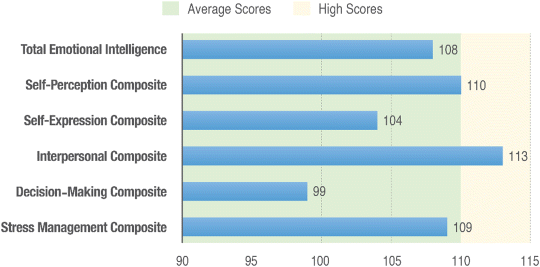
Figure 16.2 Total Emotional Intelligence and Composite Scale Scores for Musical Artists
Source: Reprinted with permission, © Multi-Health Systems, 2016.
In our work with these artists we have already begun to find some trends. For example, as seen in Figure 16.2, this group is particularly strong in their Interpersonal composite (consisting of Interpersonal Relationships, Empathy, and Social Responsibility). The Interpersonal composite describes an individual's ability to connect with others in a meaningful way. This ability is especially important for musicians who make concerts more enjoyable by connecting with the audience. This ability also facilitates getting along with fellow musicians, booking agents, managers, and others.
When we look more specifically at their emotional intelligence strengths we find that their highest scores are in Social Responsibility, Self-Actualization, and Empathy as shown in Figure 16.3.
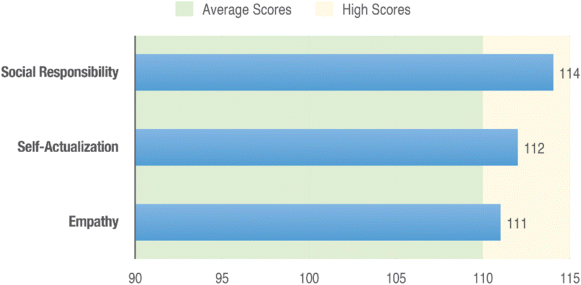
Figure 16.3 Highest Emotional Intelligence Scores for Musical Artists
Source: Reprinted with permission, © Multi-Health Systems, 2016.
The high Social Responsibility score suggests that these artists are constructive members of society who act in support of the common good. As artists, many are involved in social causes and they tend to be very socially conscious. Many of them gain strength and inspiration from their concerns about the world around them and reflect this in their music.
A high Self-Actualization score suggests that these artists find meaning and purpose in their careers. They will often set challenging goals for themselves and motivate themselves to reach these goals. The artists continually find ways to ensure that their talents are being optimally leveraged, and seek advice from mentors for ideas when needed.
Their high Empathy score indicates that this group shows the ability to recognize, understand and appreciate the way others feel. Music manager Irving Azoff, probably one of the most successful talent managers in the business, whose clients include Christina Aguilera, Journey, the Eagles, Dan Fogelberg, Joe Walsh, Van Halen, Thirty Seconds to Mars, Steely Dan, Bon Jovi, and many others, talked about this in an interview in a Billboard Magazine video.7 He said that the most important thing for an artist's success was to know how to read and interact with a live audience.
Empathy is particularly important in the ability to connect with others, and helps the artists read an audience to determine how their performance is being received. It helps discern whether or not the audience connects with a particular song, or even more generally, with how they present themselves as an artist.
Empathy is also important in dealing with fellow band members and other musicians. Not long ago I had an opportunity to meet Max Weinberg, the highly successful drummer in Bruce Springsteen's E-Street Band. We talked about my research and he told me about how he started drumming at six years of age. It was after seeing Ron Tutt (Elvis Presley's drummer) perform on TV that he was hooked. Max had his first performance in front of an audience at age seven. But one of the key elements of his success (how he beat out 63 drummers who originally auditioned for Springsteen) was his ability to focus, listen, and watch. He knew his job was to support the other musicians, not to overshadow. It takes a lot of self-awareness (knowing your strengths), impulse control (keeping from showboating), empathy (reading others), and interpersonal skill (working with others) to pull this off.
The challenges in emotional skills for our musical artist sample can be seen in Figure 16.4. These include Emotional Expression, Impulse Control, and Problem Solving.
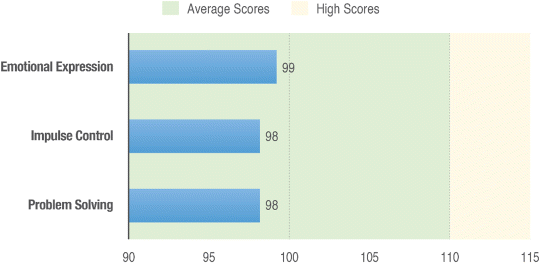
Figure 16.4 Lowest Emotional Intelligence Scores for Musical Artists
Source: Reprinted with permission, © Multi-Health Systems, 2016.
The lower scores suggest that, while the group may be aware of their feelings, they may have difficulty expressing or articulating some emotions. Although they may express themselves through their music, they are coached on better using emotional expression in relationships and performances.
Their impulse control was within the average range, suggesting that the artists are generally able to resist or delay impulses to act. However, under times of stress or pressure, they may be more impulsive than normal. This was a rich area for coaching.
The Problem Solving scale measures how effectively an individual uses their emotions in the process of solving problems. The group average suggests that the artists can use their emotions effectively to focus on the problem at hand, but there may be areas of life where emotions can get in the way. For example, when it comes to solving problems, making decisions, or getting things done, emotions can get in the way, more than helping the situation. While successful people can use their emotions effectively to focus on a problem at hand, people low in this skill sometimes let emotions get in the way of decision making. Suggestions for change have included working on better planning processes and setting deadlines for resolving issues. These strategies promote using an efficient decision-making process, using emotion to enhance (not inhibit), and reducing the likelihood that they will delay addressing the tough decisions.
The Entrepreneur Edge provides the mentors of the CMI program with an overview of entrepreneurial skills which the artist currently uses, along with those in need of development. It looks at broad areas, such as Mind-Set, Self-Management, Dealing with Others, and Business Orientation, along with a number of more specific, actionable competencies.
As seen by Figure 16.5, this group shows the most strength in their ability to deal with others. This group will likely have few issues in introducing themselves to others, networking with others, and seeking the advice of others in order to overcome challenges. This pairs well with the findings in the EQ-i 2.0.
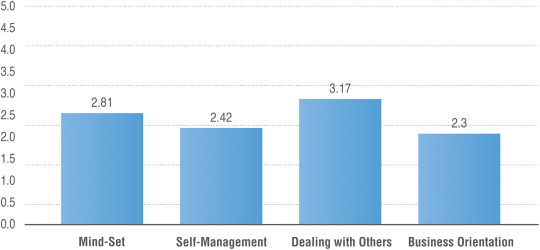
Figure 16.5 Key Entrepreneur's Success Scores for Musician Artists
Source: Reprinted with permission, © Multi-Health Systems, 2016.
The specific entrepreneurial strengths can be seen in Figure 16.6. These include strengths in the Explorer area—creative problem solving; Innovation—looking at new ways of doing things; and Optimism—identifying the opportunities ahead.
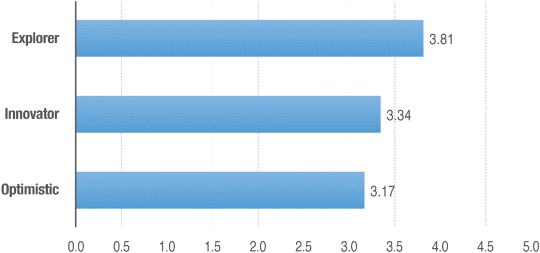
Figure 16.6 Entrepreneurial Strengths of Musician Artists
Source: Reprinted with permission, © Multi-Health Systems, 2016.
An individual with a high Explorer score involves others in creative problem solving and shares knowledge with others. Continuing to harness these skills will help the artist maintain close bonds with their mentors and other artists. It is interesting to note that this coincides with the finding that this group possesses strong interpersonal emotional intelligence competencies.
Artists with high Innovator scores take pride in suggesting alternatives and new solutions, and show a preference toward rethinking existing assumptions. Apart from the benefit that innovative creativity can bring to an artist's music, this creativity can be used to develop different solutions to new challenges that the artist will encounter in his or her career.
Individuals with a high Optimistic score can quickly identify the positive, even in challenging situations. Maintaining this optimistic outlook can help the artist overcome setbacks in their career, especially as they seek alternate outcomes to current challenges. When this score is considered together with their Innovator score, it suggests that they may see success as an indicator that they can trust their instinct toward innovation, making them more willing to take creative risks.
The lower scores for this group are shown in Figure 16.7.

Figure 16.7 Entrepreneurial Challenges of Musician Artists
Source: Reprinted with permission, © Multi-Health Systems, 2016.
A person with a high score in Knowledge Seeking seeks the knowledge and advice of industry experts. They are also future-looking and attracted to emerging technologies that have the potential to change the industry. As this group of artists are students of the CMI program, it's likely that they value the knowledge and advice of industry experts. However, as this is one of the group's lower scores, they may be too focused on the present and not enough on upcoming changes in the industry.
Individuals with high Proactive scores consider the need for change an important issue, and seek to develop new skills. They are likely to monitor and measure the results of their efforts to evaluate progress and demonstrate the value of change. As this is one of the group's lower scores, they may be focusing on improving their existing skills (such as their vocal talent), rather than developing new skills (such as the ability to market themselves). Thus, they may be missing opportunities created as the result of changes in the music industry.
People with high Multitasker scores can work effectively across disciplines (such as both music and finances). In addition, they are more likely to seek multiple ventures simultaneously. As this is one of the group's lower scores, they are likely focusing too much on the music discipline while neglecting other competencies required for a successful career as an artist. Alternatively, they may even be focusing too much on one project or genre. Multitasking, in this case, involves paying attention to a number of different areas—from business-oriented activities (booking gigs, managing bandmates, publicity, legal) to perfecting your music (ensuring your music is the right genre, writing new music, arranging the music, rehearsals).
Succeeding as a musician is probably more difficult today than at any other time in the entertainment industry. There's no clear path to success and there are fewer venues promoting live performances. The role of the recording labels has significantly shifted with the demise of traditional albums. Of course, there are challenges in many careers in today's fast-moving world. Our research has shown that understanding one's emotional intelligence and entrepreneurial preferences can be a useful endeavor for anybody looking to understand how to leverage their unique strengths and focus their development in our fast-paced world.
